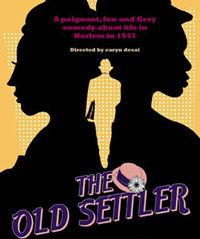Two women test bonds of sisterhood in The Old Settler

Two women test the bonds of sisterhood in John Henry Redwood's bittersweet comedy, The Old Settler. ICT artistic director caryn desai [sic] directs Ryan Vincent Anderson, Veralyn Jones, Tarina Pouncy and Karen Malina White in a four-week run, June 3 through June 26 at International City Theatre in the Long Beach Performing Arts Center. Low-priced previews take place on Tuesday, May 31; Wednesday, June 1; and Thursday, June 2.
Set in Harlem during World War II, when hot music played and swing dancers ruled the floor of legendary nightclubs like the Savoy Ballroom, The Old Settler is a funny and moving story about hope, love, dreams, disappointment and forgiveness. Middle-aged sisters Elizabeth and Quilly have learned to put past differences behind them. But when a handsome young man named Husband takes a room as a boarder, old hurts and new tensions are brought to the surface.
"It's about the need for love and the pain of loneliness," says desai. "But there's also a lot of humor, and the play's setting is fascinating. In 1943, Harlem was a nerve center of music and culture for blacks and whites alike. Remember, this was during the war, long before the Civil Rights movement."
The Old Settler was first performed at the 1995 Eugene O'Neill Theatre Conference in Waterford, Connecticut. It was seen there by the Russian Theatre Union, and in 1996, the play was produced in Sheleykovo, Russia, followed by a run in Moscow. In 1997, The Old Settler had its first American production at the McCarter Theatre in Princeton, New Jersey, a co-production with New Haven's Long Wharf Theatre. Since then, there have been numerous productions of The Old Settler throughout the U.S. The Old Settler has been recognized with an American Theatre Critics Award, the Virginia Duvall Mann Award, the Beverly Hills/Julie Harris Playwrights Award, and the Bryan Family Foundation Drama Award for Southern Literature. In 2001, The Old Settler was adapted for television and presented by PBS, starring Debbie Allen and Phylicia Rashad.
"When I was in Russia," Mr. Redwood once said in an interview, "we had a question and answer session and someone stood up and said that the play is very Chekhovian. That's why it took so well over there. But the greatest honor came to me when a woman stood up and said that she didn't believe that a man had written this play. That was the greatest compliment in the world to me."
